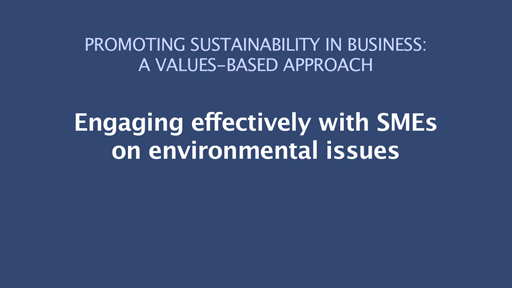1.2 Effective engagement with SMEs
In the opening activity, low carbon advisor and researcher Sam Hampton opens the course with a brief introduction to the challenge of engaging more effectively with SMEs on environmental issues.
Activity 1.1: Engaging effectively with SMEs on environmental issues
Sam Hampton is a low carbon advisor with OxLEP Business, supporting local firms to reduce their environmental impact. He has also conducted research on energy policy, SMEs and the role of intermediaries at Oxford University’s Environmental Change Institute. In the following video, Sam sets out some of the more common arguments for addressing the environmental performance of smaller businesses. He also talks about the challenges that people face when they seek to engage business owners and managers in discussions about their environment-related practices. Lastly, he considers how a values-based approach might help to address some of these challenges. |

Transcript
Engaging effectively with SMEs on environmental issues
[MUSIC PLAYING]
[Why are SMEs so important in addressing climate change and other environmental issues?]
[Working with low carbon advisors]
[Personal and business values]
[Values-based engagement vs. conventional policy interventions]
[MUSIC PLAYING]
[The ‘Growing Greener’ project team has drawn on these insights, related research findings, and run a series of practitioner workshops to co-create a toolkit for values-based engagement]
Watch the video (around 4 minutes) and make your own notes on the following points:
- Sam gave a number of reasons why SMEs have an important role to play in addressing climate change and other environmental issues. Summarise his arguments in your own words, indicate how far you agree with him, and note any other issues that you see as important.
- Sam explained how his research on people working with SMEs, and his own experience as a low carbon advisor, reinforced the view that, ‘it’s the soft stuff that’s hard’. In other words, while technical discussions can be difficult at times, many practitioners find that the most difficult part of their role is dealing with the attitudes and values of business owners and managers. What is your initial reaction to this argument (e.g. how does it compare to your own experience)?
- Sam suggested that a ‘values-based’ engagement approach could reinforce conventional policy interventions, such as financial incentives and advisory services. Are you convinced by his arguments (e.g. do you think that this approach might work in your own work setting)?
We recommend that you keep these notes as a record of your initial thoughts that you can revisit during the course. Feel free to copy them into the note-taking file provided [Tip: hold Ctrl and click a link to open it in a new tab. (Hide tip)] .
Comment
This video and the accompanying questions are designed to get you thinking about the concept of values-based engagement and how it might be used in your own situation. There are no ‘right’ or ‘wrong’ answers, but you may be interested to know that practitioners in our research, and at the workshops, expressed a range of views on these issues.
- Some advisors felt that it was too difficult to initiate relationships with SMEs on anything other than financial terms:
- ‘It’s pretty basic really – we go on the pound sign. That’s how we sell these programmes to businesses. We've come across it time and time again: when we rock up with a clipboard and say we're from the County Council, the shutters come down.’ (SC)
- ‘A lot of businesses seem to think that it’s some sort of scam or catch.’ (GD)
- However, advisors knew that the financial case for being more energy efficient wasn’t enough to convince SMEs to make changes.
- ‘I’ve seen 10 billion projects start and fail because all they do is go in and do an audit, write a report, leave a report, walk away. Nothing happens and I get absolutely infuriated because it is not just information failure, it’s a wider, more complex market failure.’
- Most advisors in our research were themselves strongly motivated by the desire to fight climate change. And it was a source of frustration that in their work they nearly always avoided that topic, and tried to achieve carbon emissions reductions through other means:
- ‘Every time I speak to businesses I tell them they can save money, that’s the main focus. I know the business is not going to be that interested in being green. Even though they should, it’s just one of those things.’ (GD)
- Other programmes would not compromise on their own values and wanted to build them into their engagements with SMEs:
- ‘We're looking to imbue the project with our ethics, in everything we do. But there is a sensitivity with respect to marketing, because you're approaching a market which is not necessarily aware or wants to know about reducing their carbon footprints.’
 Thinking point
Thinking point
Consider how the ideas in the first activity may relate to your own professional experience. If you’ve worked with SMEs before, do you think you have made assumptions about what motivates them? What motivates you to do the job you do?
1.1 Introductory case

